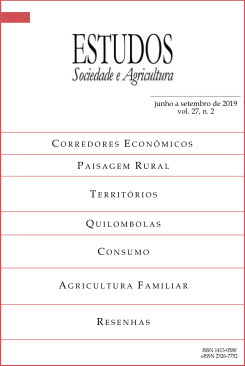Public policies for family agroindustries and regional development
Políticas públicas para agroindústrias familiares e o desenvolvimento regional
DOI:
https://doi.org/10.36920/esa-v27n2-9Abstract
Family agroindustries have been considered by many authors to represent an important alternative to sustain family-based agriculture. The effectiveness of this activity has led governments to discuss and implement public policies that facilitate the formalization of these enterprises and expand their marketing scope. Thus, the objective of the study is to identify the profile of family farms from Rio Grande do Sul, Brazil, that use the Sabor Gaúcho label on their products and to verify the possible influence of the State Family Agroindustry Policy (PEAF) on the operation and development of these enterprises in the perception of their managers. The study was quantitative and was carried out with 128 family agroindustries of Rio Grande do Sul (RS). From the results obtained, it is possible to conclude that in the Family Agroindustry (AFs) analyzed, the use of the Sabor Gaúcho label and participation in the PEAF have a significant importance in the operation and development and even in the conception of some ventures that were born from the incentives of this program.
Keywords: family agroindustries; public policy; Sabor Gaucho label.
DAMKE, Luana Inês; GOMES, Clandia Maffini; GODOY, Taís Pentiado; ROSA, Luciana Aparecida Barbieri da; PATIAS, Tiago Zardin. Políticas públicas para agroindústrias familiares e o desenvolvimento regional. Estudos Sociedade e Agricultura, v. 27, n. 2, p. 418-439, jun. 2019.
Submitted in october 2018.
Accepted in march 2019.
Downloads
Downloads
Published
Issue
Section
License
Authors who publish in this journal agree to the following terms:
a) Authors maintain the copyright and grant the journal the right of first publication, with the work simultaneously licensed under the Creative Commons Attribution License which allows the sharing of the work with acknowledgment of authorship and initial publication in this journal.
b) Authors are authorized to take additional contracts separately, for non-exclusive distribution of the version of the work published in this journal (eg publish in institutional repository or as a book chapter), with acknowledgment of authorship and initial publication in this journal.
c) Authors are allowed and encouraged to publish and distribute their work online (eg in institutional repositories or on their personal page) at any point before or during the editorial process, as this can generate productive changes, as well as increase the impact and citation of published work (See The Effect of Free Access).






